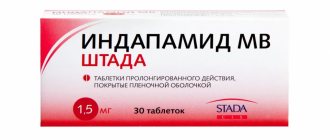Side effects of the drug Arifon retard
Considering the fact that most of the side effects of indapamide are dose-dependent, reducing the content of the active substance in the Arifona retard tablet to 1.5 mg made it possible to significantly reduce the likelihood of developing side effects. Hypokalemia may develop (especially in patients at risk); hyponatremia, accompanied by hypovolemia and dehydration with the possible development of orthostatic hypotension. Concomitant loss of chloride ions may secondary cause compensatory metabolic alkalosis. Hyperuricemia and hyperglycemia are possible; hypercalcemia is very rare. Hematological disorders develop extremely rarely: leukopenia, thrombocytopenia, agranulocytosis, hemolytic or aplastic anemia. From the digestive tract, nausea, constipation, dry mouth are observed, in isolated cases - pancreatitis, in patients with liver failure - hepatic encephalopathy. From the central nervous system - dizziness, asthenia, paresthesia, headache. Hypersensitivity reactions are possible in patients prone to them (maculopapular rash, purpura, exacerbation of systemic lupus erythematosus).
Overdose of the drug Arifon retard, symptoms and treatment
Symptoms of overdose (taking very large doses) are primarily manifestations of water and electrolyte disturbances (hyponatremia, hypokalemia). Clinically, nausea, vomiting, hypotension, convulsions, drowsiness, dizziness, polyuria or oliguria up to anuria (which is a consequence of hypovolemia) may occur. First aid measures include rapid elimination of the drug by gastric lavage and/or administration of activated carbon, followed by restoration of water and electrolyte balance in a hospital setting.
Pharmacological properties of the drug Arifon retard
Indapamide ((RS)-4-chloro-3-(sulfamoyl)-N-(2,3-dihydro-1H-indol-1-yl)-benzamide) is a diuretic, antihypertensive agent. The chemical structure is a sulfonamide derivative with an indole ring. Its pharmacological properties are similar to thiazide diuretics. Due to the complex mechanism of action, Arifon has a pronounced hypotensive effect and does not cause a significant diuretic effect. The action is carried out at the level of the kidneys and blood vessels. At the kidney level, indapamide increases the excretion of sodium and chlorine ions in the urine, and to a lesser extent, the excretion of potassium and magnesium, contributing to a slight increase in diuresis. The effect of indapamide on the vascular wall is due to its high lipophilicity. Indapamide changes the transmembrane flow of ions (mainly calcium), reduces the sensitivity of the vascular wall to adrenaline and stimulates the synthesis of substances with vasodilatory activity - prostaglandin E2 and prostacyclin I2. This leads to dilation of arterioles, a decrease in peripheral vascular resistance and blood pressure. Arifon reduces left ventricular hypertrophy; does not affect lipid metabolism (TG, LDL cholesterol, HDL cholesterol) and carbohydrate metabolism, including in patients with hypertension (arterial hypertension) and diabetes mellitus, reduces the severity of microalbuminuria. The antihypertensive effect of the drug persists in patients on hemodialysis. The use of an innovative dosage form based on a hydrophilic matrix ensures uniform release of indapamide and effective blood pressure control for 24 hours, and also allows reducing the content of indapamide per tablet to 1.5 mg and thus reducing the risk of hypokalemia by 62%. When prescribed at a dose of more than 1.5 mg, the antihypertensive effect of the drug does not increase, while the likelihood of side effects increases. Indapamide is quickly and completely absorbed from the digestive tract. The maximum concentration in the blood serum after a single dose is reached after approximately 1–2 hours. The equilibrium state is achieved after 7 days from the start of treatment. 79% of indapamide binds to plasma proteins. The half-life averages 18 hours (14–24 hours). About 70% of indapamide is excreted in the urine, 22% in feces. The pharmacokinetics of the drug does not change in patients with renal failure. In patients with hepatic impairment, the use of thiazide or thiazide-like diuretics may cause the development of hepatic encephalopathy.
Special instructions for the use of the drug Arifon retard
Before starting treatment and during the period of use of the drug, the level of potassium, sodium, calcium and glucose in the blood plasma should be monitored, kidney function should be monitored (creatinine and urea levels in the blood plasma) and ECG monitoring, especially in cases of water-electrolyte balance disorders and gout , diabetes mellitus, liver or kidney failure, in elderly patients. Hypokalemia (less than 3.4 mmol/l) is a predisposing factor in the development of dangerous arrhythmias and increases the toxicity of cardiac glycosides. Such patients should more often monitor the level of potassium in the blood serum and correct it, especially in patients at risk (elderly people, with an unbalanced diet, in patients with liver cirrhosis, coronary artery diseases, heart failure, with a prolongation of the QT by ECG). The possible development of hyperuricemia contributes to the occurrence of gout attacks. The use of the drug in athletes may cause a positive reaction during doping control. The drug is not recommended for use in children. Arifon retard does not interfere with psychomotor reactions and can affect the ability to drive vehicles and operate dangerous machinery only in the event of a sharp decrease in blood pressure. It is not recommended to prescribe the drug during pregnancy and breastfeeding.
